Page Contents
Keto diet
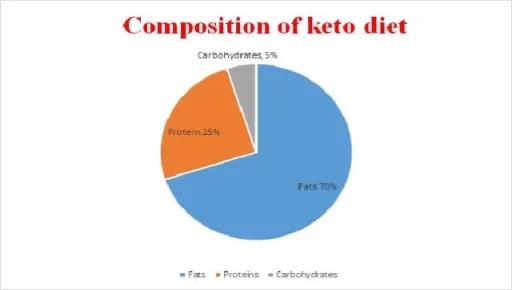
Keto diet is a very low-carb and high-fat diet. This helps you lose weight more quickly.
The main difference between a low carb diet and the keto diet is that in a low carb diet the daily carb intake is between 50-150 gms.
Whereas in a keto diet the daily carb intake is less than 50 gms.
Apart from this, the Keto diet is also beneficial for patients suffering from diabetes, epilepsy, cancer, Alzheimer’s, etc.
Science behind the keto diet:

Carbohydrate intake in the body is greatly reduced when we take a ketogenic diet.
Carbohydrates are eventually replaced by fats in the keto diet.
When this happens the liver produces ketones from fat. These ketones act as an alternative fuel source for your body.
It can be used as fuel especially when the glucose (blood sugar) supply is low.
These ketones are mainly used as a fuel source for the brain.
This is due to the fact that the brain consumes a lot of energy, 24 hours a day.
Thus choosing a ketogenic diet results in the fast burning of fat. This results in greater weight loss.
Who should avoid keto diet:
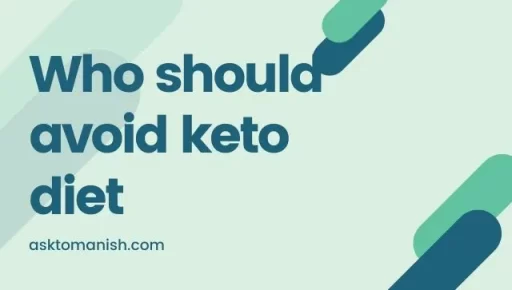
Although this diet is safe for most people. But following three groups should avoid taking a keto diet.
1. People on medication for diabetes:
This is due to the fact that avoiding carbohydrates lowers your blood sugar level. This reduces the need for medication to lower blood sugar.
Taking a ketogenic diet with the same dose of the drug can cause low blood sugar.
2. People on medication for high blood pressure:
If you are taking blood pressure medicine, starting a keto diet can lower blood pressure.
This is due to the fact that you become very healthy. This makes the medicines counter-effective.
3. Lactating mothers:
Lactating mothers should avoid the keto diet as it can cause ketoacidosis in some rare cases.
Ketoacidosis is basically a condition in which blood sugar and ketones rise to dangerous levels.
As a result, people may feel extremely ill and experience vomiting, weakness, dehydration, and abdominal pain.
This requires hospitalization so that blood sugar levels can return to normal.
Foods to eat:
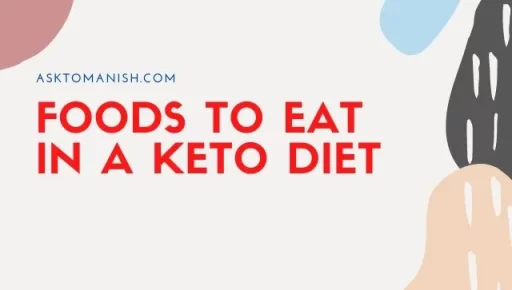
The main factor to keep in mind while following this diet is that foods should contain a high amount of fat and a moderate amount of protein:
1. Cheese: Cheese, unprocessed cheese.
2. Eggs: Try to have omega-3 whole eggs.
3. Seafood: fish, shellfish, etc.
4. Meat: Chicken, Red meat, etc.
5. Seeds and Nuts: Walnuts, almonds, linseed, pumpkin seeds, etc.
6 Healthy oils: coconut oil, avocado oil, olive oil.
7 Cream and Butter: Use grass fodder butter if possible.
8. Low-carb vegetables: Spinach, green leafy vegetables, broccoli, onions, tomatoes, white mushrooms, cucumbers, etc.
9. Low-carb fruits: Avocados, berries (blackberries, or strawberries)
Foods to avoid:
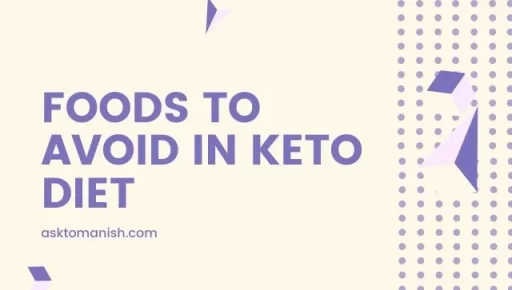
Beans: Beans, lentils, kidney beans, peas, chickpeas, etc.
Grains: Rice, wheat-based products, pasta, grains, oats, etc.
Aromatic products: These include sugary beverages such as juice soda, added sugars, and sweeteners, ice cream, candy, cakes, sugar, etc.
Starchy vegetables: These include potatoes, sweet potatoes, corn, carrots, etc.
Alcohol: Alcohol, beers, cocktails, etc.
Fruit: All fruits except avocado and strawberry.
Benefits of keto diet
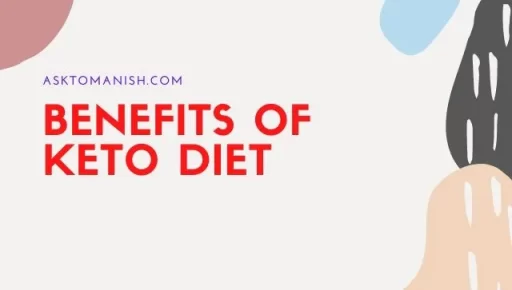
1. Losing weight: As stated earlier, the body uses fat as a source of energy in the keto diet. This causes more weight loss. In addition, insulin levels are significantly reduced. This causes a lot of weight loss because insulin is the fat storage hormone.(Read Study)
2. Control blood sugar: Studies show that keto diet lowers blood sugar levels.
Therefore it is more effective in preventing and managing blood sugar levels than other low-calorie diets.
3. Improves cardiovascular health: This diet is a low-carb high-fat diet.
So it increases HDL (good cholesterol) and lowers (bad cholesterol) in addition to triglycerides levels.
All these factors improve heart health and reduce the risk of heart disease.
4. Blood pressure management: Some blood pressure problems are directly linked to excess weight.
So this diet helps in curing these issues as it helps to lose weight.
5. Treatment of epilepsy: Ketogenic diet has been used successfully for the treatment of epilepsy for many years.
6.Better concentration: Following the keto diet leads to better focus and increased mental performance.
When you take a ketogenic diet, you avoid a sharp rise in blood sugar. The ketones obtained as a result of the keto diet are an excessive source of fuel for the brain.
Together these two factors lead to better focus and concentration.
7.Acne: Studies show that there is a connection between acne problem and high carb diet so switching to keto diet will definitely help in this case.
Also, it is a common experience that your skin improves when you switch to a keto diet.
8.Other diseases: Keto diet helps reduce the symptoms of diseases like Alzheimer’s and Parkinson’s and slow down their progress.
Common side effects and how to reduce them:
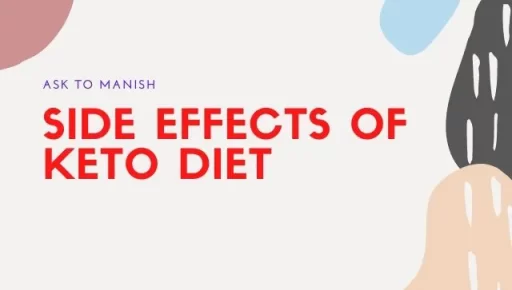
1. Cramps: Switching to a ketogenic diet can cause body cramps. The most common are leg cramps.
Make sure you drink more water to reduce them.
2. Heart palpitations :It is often seen in some cases that when you start taking Keto diet. Your heart starts beating faster and harder.
This is a fairly common phenomenon, so you do not need to worry about it.
If the problem persists for a long time. Increase your liquid intake and take a sufficient amount of salt.
In addition, potassium supplements can be taken once a day.
3. Constipation: Switching to a keto diet can also cause constipation in some cases.
This is due to the fact that the body has to adjust to digesting a large amount of fat, by digesting a lot of carbs.
To reduce this make sure that you include lots of fiber in your diet.
Another remedy is to increase your water intake. The ideal amount is to increase your water intake by about 4 liters/day.
If the problem still persists, use psyllium husk powder or a probiotic to solve the problem.
4. Decreased physical performance: Switching to a keto diet may decrease your physical performance in the early days.
This is due to the fact that it takes time for the body to adapt to using fat instead of carbohydrates.
After a few days when your body adopts a keto diet. Then the situation becomes normal.
If the problem still persists then it is recommended to take some carbs before the workout.
Conclusion:
Although it is difficult to follow the keto diet in the initial stage. But later it becomes easier.
This is due to the fact that with the passage of time the body adopts itself to this diet.
This diet is great for those who are obese or overweight. It can also have a great impact on overall health.
It reduces cholesterol, fat, body weight, and blood sugar. Besides this, it also helps in improving metabolic health.
But it is important to be consistent while following this diet. It only works if you stick with it for a long time.
Also Read : 1. Common diet plans for weight loss.
2. Intermittent fasting plan for weight loss.

Excellent dite plan for weight loss
Thanks dear for your feedback
Very good blog . work show research of the topic.very helpfull
Thanks.Keep reading
Pingback: Hormones And Weight Gain - Are They linked And How To Fix It
Hi it’s me, I am also visiting this web site regularly, this web page is genuinely pleasant and the people are actually sharing fastidious thoughts.
Thank you very much for apreciation
Thanks in favor of sharing such a fastidious thinking, paragraph is fastidious,
thats why i have read it entirely
Thank you